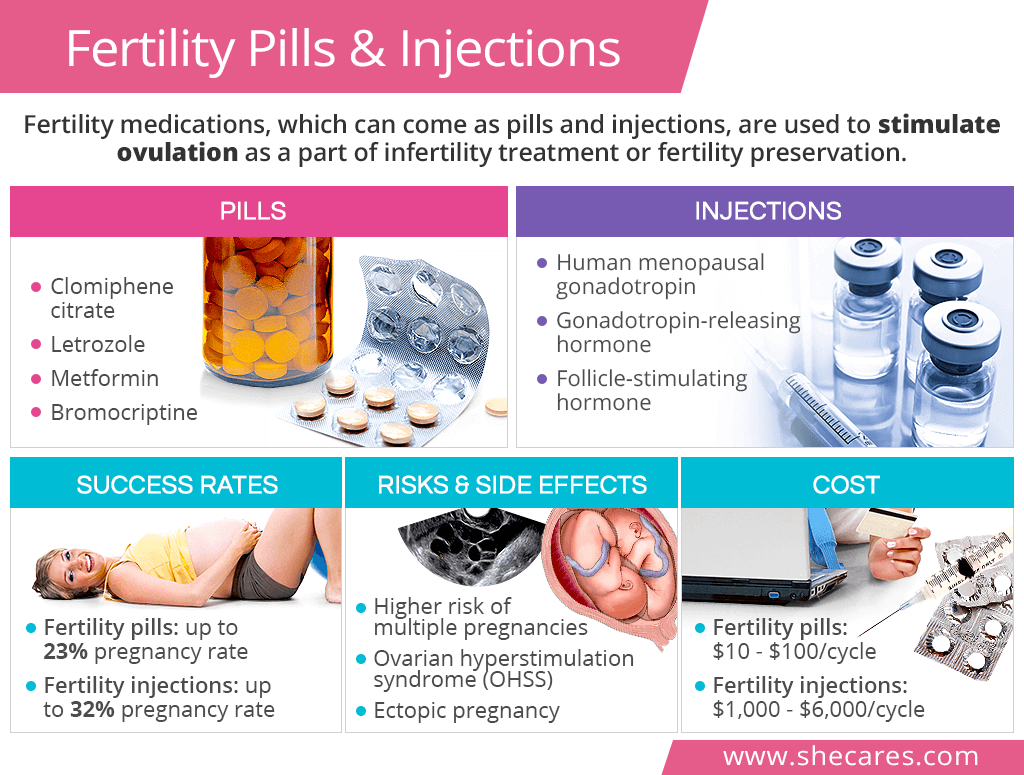Most Common Fertility Pills & Injections
Fertility pills and shots to get pregnant are typically administered for 7 to 12 days shortly after a woman's cycle to stimulate the maturation of the ovarian eggs. They include the following medications:
Fertility Pills
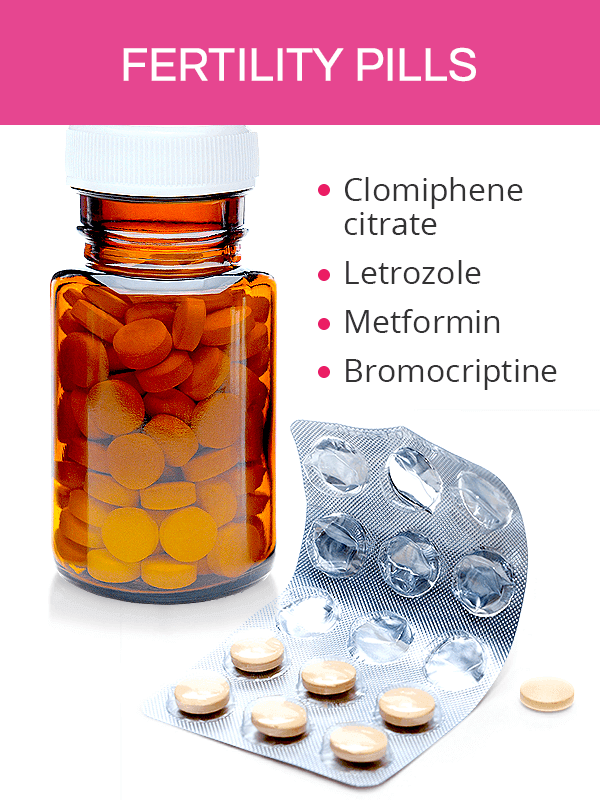
Clomiphene citrate pills are the most common fertility medication, which works by stimulating the pituitary gland to produce adequate hormones needed for ovulation to be restored.
Letrozole pills, also known as aromatase inhibitors, work by temporarily lowering the levels of progesterone so that the body increases the levels of FSH, thus stimulating more abundant egg maturation and ovulation. It is used off-label for fertility, especially in women with polycystic ovary syndrome (PCOS), as it was originally used to treat breast cancer.
Metformin pills work by lowering high levels of androgens in women with insulin resistance or diabetes as well as PCOS. This medication is sometimes used in combination with FSH or clomiphene citrate. It is also used off-label for fertility as it is a diabetes medication.
Bromocriptine pills are used to resolve abnormal ovulation caused by high levels of prolactin, or hyperprolactinaemia.
Fertility Injections (commonly called gonadotropins)
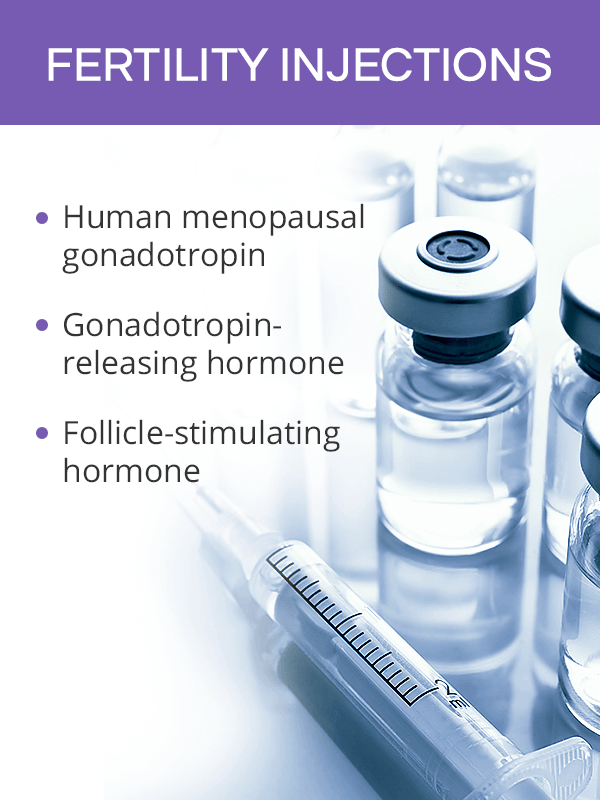
Human menopausal gonadotropin (hMG) injections are used to stimulate the maturation of eggs in the ovaries when the pituitary gland fails to do so.
Human chorionic gonadotropin (hCG) injection is also known as a trigger shot because once administered, it will trigger ovulation to take place in the next 24 to 36 hours. This medication often follows fertility pills, such as clomiphene citrate, when eggs are mature enough for ovulation.
Gonadotropin-releasing hormone (GnRH) analogs and antagonists can come as injections or a nasal spray. These medications, which are used often during in vitro fertilization (IVF), stimulate the pituitary gland to halt ovulation so that the uterus is prepared for an embryo transfer.
Follicle-stimulating hormone (FSH) injections stimulate the ovaries to mature numerous eggs. FSH shots can be used alone or in a combination with other gonadotropins.
Once the eggs are mature and ready to be released on ovulation, a couple will be either advised to attempt natural conception in a timely manner, or a woman will undergo artificial insemination, most precisely intrauterine insemination (IUI). Alternatively, the eggs will be harvested for IVF or egg freezing.
Fertility Pills and Injections Success Rates
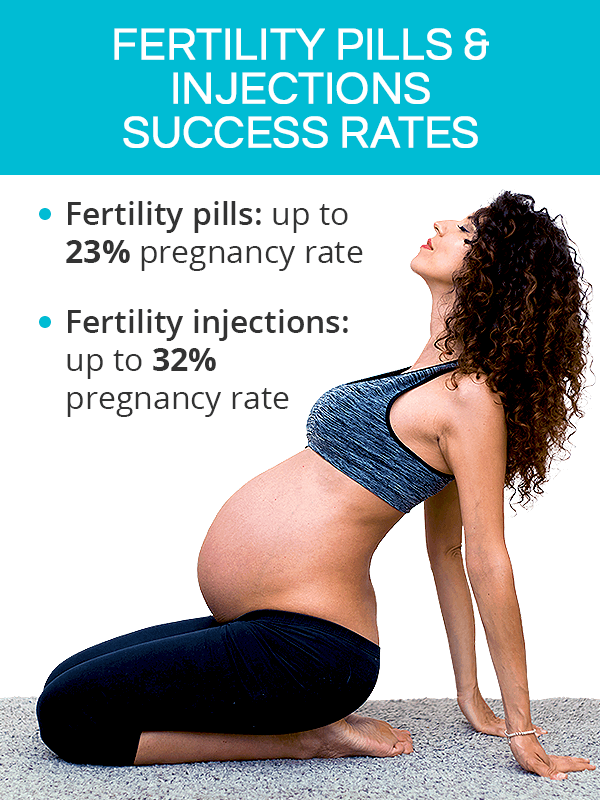
Success rates of fertility drugs, whether taken in a pill or injection form, depend on numerous factors, such as the cause of infertility, a woman's age and health status, and her partner's reproductive health, among others.
Generally, women need three to six treatment cycles before achieving pregnancy.
Rates of live birth after using clomiphene citrate have shown about 23% and 18% when using letrozole.
Pregnancy rates using gonadotropins tend to be higher than when using pills, about 32%.
Fertility pills have been found to induce ovulation in about 60% of PCOS women.
Bromocriptine has shown to induce ovulation in 85% of women, up to 80% of which successfully conceive.
Fertility Pills and Injections Side Effects
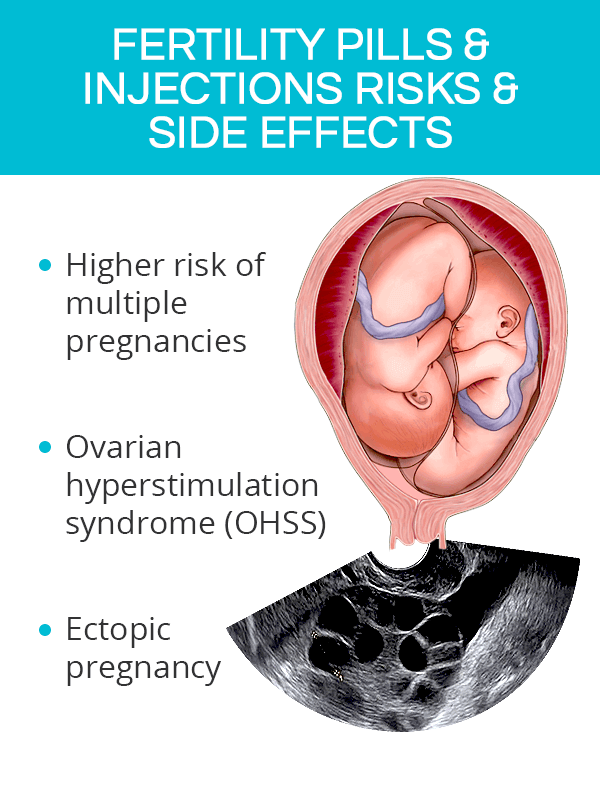
Mild Side Effects
Generally, fertility pills have been linked to lesser side effects than fertility injections. Potential adverse reactions might include fatigue, dizziness, headaches, bloating, trouble sleeping, hot flashes, and acne, among others. Although bothersome, these side effects are generally not serious. In rare cases, women experience vision disturbances.
Multiple Pregnancies
Inducing ovulation with fertility pills and injections has been associated with increased rates of twins, triplets, or other multiple gestations. As such, women are at a higher risk of pregnancy complications, including premature birth.
Up to 10% of women with clomiphene citrate and letrozole pills have twin pregnancies.
Up to 30% of women treated with gonadotropins injections have multiple gestations.
Ovarian Hyperstimulation Syndrome (OHSS)
OHSS happens when the ovaries are overstimulated with fertility medications and become painful and swollen. The syndrome might be accompanied by abdominal pain, vomiting, shortness of breath, and rapid weight gain, which typically appears about 10 days after administration. Most cases of OHSS, up to 20%, are caused by gonadotropin injections, but pill-form fertility drugs might also cause the syndrome. Although its mild to moderate forms can be treated, severe OHSS might be life-threatening.
Ectopic Pregnancy
Gonadotropin injections have been associated with slightly higher rates of ectopic pregnancies, which occurs when the egg implants itself outside the uterus. Such instances are potential medical emergencies that require immediate attention.
Fertility Pills & Injections Cost
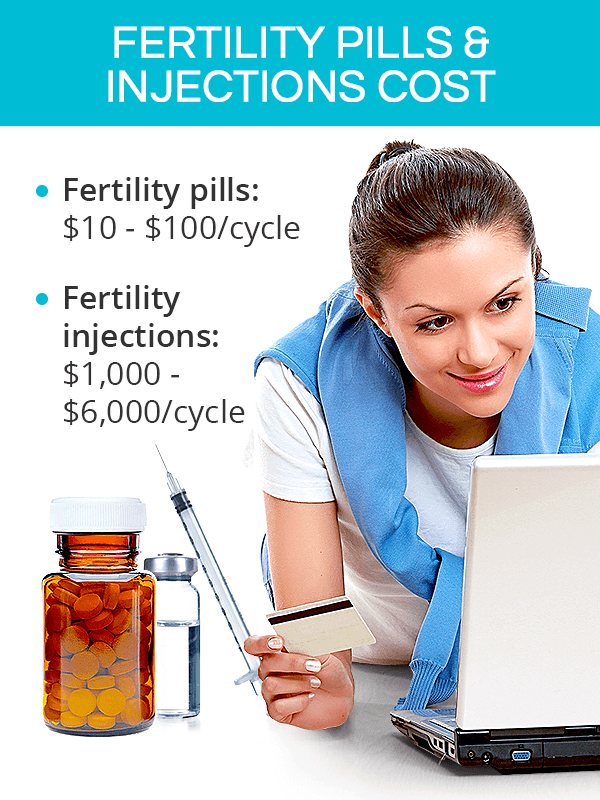
Fertility pills cost from $10 to $100 per cycle. The cost of fertility injections, on the other hand, is much higher and can range between $1,000 and $6,000 per cycle.
This cost only covers the medications without doctor's visits, blood work, and other medical services, such as IUI or IVF. Insurance coverage depends on a woman's individual plan. In many cases, fertility treatments are not covered at all or only partially.
Key Takeaways
Fertility pills and injections can be a tremendous help for women who cannot get pregnant naturally due to infertility. They work by stimulating the ovaries to mature eggs for ovulation, and they can be administered as pills, such as clomiphene citrate, letrozole, or metformin, or as injections, including hMG or FSH. Though generally effective in stimulating ovulation and achieving pregnancy, fertility drugs and shots put women at an increased risk of multiple pregnancies, among other side effects. Stimulating ovulation with pills costs up to $100 per cycle; whereas, the cost of fertility injections can be as high as $6,000 per month.
Sources
- American College of Obstetricians and Gynecologists. (2017). Treating Infertility. Retrieved December 10, 2018 from https://www.acog.org/Patients/FAQs/Treating-Infertility
- Eunice Kennedy Shriver National Institute. (2017). What infertility treatments are available? Retrieved December 10, 2018 from https://www.nichd.nih.gov/health/topics/infertility/conditioninfo/treatments
- Medline Plus. (2018). Infertility. Retrieved December 10, 2018 from https://medlineplus.gov/infertility.html
- National Institutes of Health. (2014). New treatment increases pregnancy rate for women with infertility disorder. Retrieved December 10, 2018 from https://www.nih.gov/news-events/news-releases/new-treatment-increases-pregnancy-rate-women-infertility-disorder
- Office on Women's Health. (2018). Trying to conceive. Retrieved December 10, 2018 from https://www.womenshealth.gov/pregnancy/you-get-pregnant/trying-conceive
